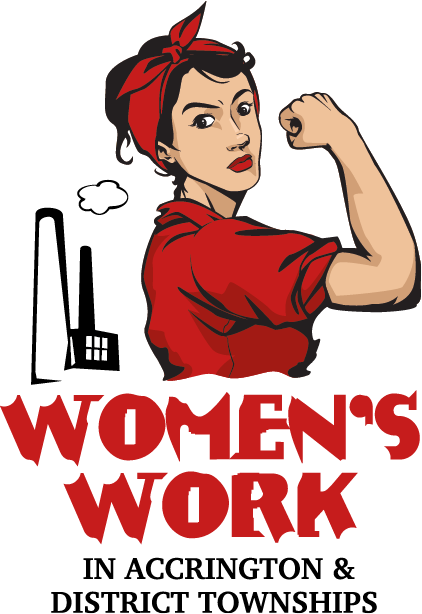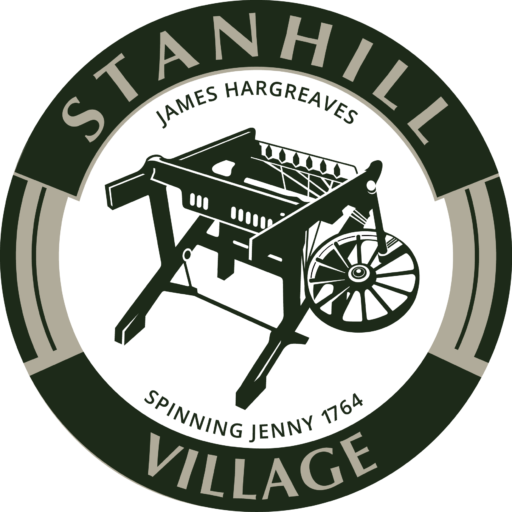This is the transcript for Kathleen’s filmed interview which took place at Accrington Market Hall during a break in Covid restrictions in October 2020. The transcript has been edited for ease of reading, but it has not been possible to edit the film footage. Antisemitic views are reported during the interview as a matter of historical record. They do not reflect the interviewee or the interviewer’s opinions. There were a lot of interruptions during the interview and sections are difficult to hear.
I was born in Oswaldtwistle. My father worked at Ewbank for a long time. He wasn’t a skilled man. But he was a man that could do everything you know. He’d been a farmer you know, and when his dad died, the farm went to the eldest son, and my dad was thrown out so he went to Ewbank and he never looked back. He was there for 30 years. He could do everything they said when he died, we’ll never have anybody like your dad. He wasn’t a skilled man. He’d never been in a factory in his life but they said he’s the best worker we’ve ever had and he’ll have a go at anything.
My mum was born in Oswaldtwistle. She was wonderful. She was a fully qualified tailor, not a dressmaker, a tailor. But she couldn’t do anything with it because she’d three children, she’d no chance, …but as we grew up she started dressmaking, and I said “Why don’t you advertise as a tailor which is what you are?” but she said “No, it’s too hard work, you’ve no idea. Next time you want something to make, I’ll show you how I make a pattern to fit you.” And it took ages, and I said, “Have you to do all that?” and she said, “yes you have, tailoring is tailoring, it’s special for you.” She was wonderful. I didn’t get on with my dad very well but I think in those days you didn’t. I didn’t know anybody who really got on with their dads. But I’d two brothers, one older and one younger, and of course they got on with my dad. And he’s still living, the older one, he’s three years older than me, he lives in Poole in Dorset. I go down occasionally.
SCHOOL
I went to Peel Park School and I got on very well there. I liked the teachers apart from the top one, I didn’t like him. He would take the little girls into the stock room and they would come out blushing and you would wonder what he’d been up to. Probably not a lot but it made me wonder so I never went in the stock room with him!
2:12 interruption
What was I good at at school? Not a lot. I didn’t like arithmetic. There wasn’t a best subject, but when I passed my scholarship of course I went to Accrington Girls High School, that was the first year it opened and I thought it was wonderful, but only for the first year.
Some of our class were very naughty and they were training us to be ladies. I wasn’t one of them thank God, but in the break time, they would go in the yard, they’d get hold of some of them, and they’d bump their bottoms on the floor, and the way they went on you’d have thought we’d killed someone, that’s no way to behave, we’re learning to be ladies. It was thrown at us the whole time, and there were only six involved, but the whole form were made to suffer. It was thrown back at us the whole way through school. I wasn’t happy at all. So I’d had enough and I told my mum I wanted to leave, there’s all this silly work going on. She said, well that’s not what you went there for, so she said, are you sure, are you not better waiting to sit your O levels? And I said, no, I can’t concentrate. So she let me leave.
FIRST JOB – WORKING IN A DRESS SHOP
So I left and I got a job in a shop in Burnley. I was 16. I worked in Harrises, it was a baby’s shop in Accrington, and I would have loved to have worked there but there wasn’t a vacancy there. It was a general shop in Burnley with ladies’ (clothes) and everything. I didn’t like it at all. I didn’t like him (the boss) he was very abrupt. It’s not like me to dislike people but I didn’t get on with him at all. I said to my dad “I’m not going to stop” and he said “I knew you wouldn’t! he’s a bloody Jew, I knew you wouldn’t like working for him.” But that didn’t mean a thing to me in those days.
The first time I went on the till, I’d been there for 3 weeks, I was six pence short. We’d to go through every sale that I’d done on my till and remember what I’d sold. Well I couldn’t remember, but the manageress who was there when he wasn’t there, she remembered. Six pence – and it would have been taken out of my wage. And I got fifteen shillings a week, and that was for Saturdays as well! It was a lot of money in those days. No I didn’t enjoy my first job at all.
WORKING IN THE MILL
Then I went to work in the mill and I loved it. My mother was heartbroken. She remembered going at five years old before she started school and they went for their breakfast at 8 o’clock (at the mill). I said “Mum, it’s nothing like that now. You don’t come home dirty and full of fluff, there’s extractors. I really enjoy it. I’ll take you in on Saturday and you’ll see why I enjoy it.” Sounds terrible but I was a good weaver and the management knew I was a good weaver. And because I had been to high school and had speech training, I was different from the other girls and I felt a bit uncomfortable at times. But of course, once you’re weaving you can’t speak, you’re lip reading because of the noise. But I found that the management came to me if there was a problem. They would put all the new stuff to me as it started coming in, and we started weaving nylon. It was a nightmare – it frays! And of course, if it frays, your shuttle flies. I dreaded my shuttle flying. It never hit me fortunately, but a lot of people had quite bad accidents.
Then I began to think, I shouldn’t be a weaver, I can do better than this. I hadn’t a lot of confidence in those days, not like afterwards. But I started with a very bad chest, and the doctor said “Another Job. Not the weaving, it’s too fluffy, the air. I know they clean it out and I know they clean the looms for you, but you’ll never have a good chest while you’re there.” So I had to come out and I think I went in another shop.
EWBANKS
I ended up going to Ewbank. My father worked at Ewbank and he said what are you going there for? I said, “I’ve got a job in the office.” He said “Oh my God, that’s worse than ever, they’ll rub it in terrible now, they’ll think it’s me that’s…” I said, “No of course they won’t I got the job myself.” But that is what he was afraid of, he thought people would think that he had pulled strings.
The interview was with a lady who lived in Burnley Road not far from where I live. I didn’t particularly like her, and I’m not one for making decisions, I don’t know what it was. But I had only been there six months and I got all the jobs to do that she didn’t want to do, like going round selling saving stamps on a Friday morning. Well it was just up my street, I love talking to people. And she said, how long did it take you? I said, well I’ve got to stop and chat to everybody who wants to buy, and I’ve to take their money and give them their change, it’s not just visiting one person you know, I’m going all round the floors.” And she said, “Alright, alright.”
After about six months the managing director sent for me and I wondered what the hell I’d done, I’d no idea. And he said, “Sit down Kathleen, take that worried look off your face, because you haven’t done anything.” He said, “Your father worked here for 30 years, he was a wonderful man, he could do any job. I’m well aware he’s died, but I would like to ask you something quite confidential. And it was about my boss. And he said, “Tell me what you do about staff sales.” Well of course working at Ewbanks, you could get it half price. And I said, they give me the order forms, I keep them till Thursday. On Friday morning I go to see the foremen of these departments and they put (the items) in a room in the warehouse. And when I finish at one o’clock, I go down there, and they buy them, and they take them straight away.”
And he said, “What do you do with the money?” I said, I take it to the bank. “Right away?” he said. “Well,” I said, “I have my lunch first then I take it.” So he said “Do you make the bank slip out?” and I said, yes. So I started to wonder what was going on, my mind was going, and he said “I’ve known you all your life and I know I can trust you. I trusted your father with this whole building. He was a wonderful man. But things are going on here that we don’t understand, and I know I can trust you.” And he did. He told me what was disappearing – two washing machines that hadn’t gone through staff sales. He asked me how many I’d sold through staff sales and I said, none, they wouldn’t come here from Burnley anyway. And the lady in the office, she left on the Friday and she didn’t come back in anymore. But she came to my house and she wanted to pay something that someone had paid her before, and she had forgotten to pay it. And my brother said, “I’m sorry she’s in bed, she’s not well, you can’t see her.”
She said, “Are you telling me tales?” He said, “No, I’m not, but I wouldn’t let you see her because she’s been told she is not to accept any money at all from anybody. That’s the way it is.” It was very awkward but…
There was a lot of chattering (about the lady from the office) but I said I don’t want to know, unless it’s something you can prove definitely. They said, “You’re one of us Kathleen, come on, not one of them,” and I said “I’m both” because I worked in personnel by then and of course you’re responsible to the management, but you’re also responsible to the girls to make sure they get a fair deal.
I loved that job, absolutely loved it. I did it for about ten years. I left eventually to go to Rists Wires and Cables. While I was in personnel, they would come and complain, “He’s always shouting at me, I can’t help it if he hasn’t shown me how to do it right.” We had a young man that came into scales, bathroom scales. He had been a salesman. He hadn’t worked in a factory before. I had more complaints about that man, the charge hand came down and said “My lasses have gone on strike.” I said, “You’re joking. Get them back on work and I’ll come back with you. We don’t have strikes at Ewbank.” I mean, we never had strikes at Ewbank. So when I went in, I said why didn’t you come down and see me? The complaint was he was telling them what to do and he didn’t have a clue. The girls made the scales, the charge hand said he’d stopped them from doing things and changed them all round (on the production line). And of course, they were paid by what they do (piece work) and how many bathroom scales go out makes a difference to their wages.
So we sat down and sorted it out, and I said “We don’t have strikes at Ewbank.” Because of course lady had gone and I was sort of in charge by then. And I loved it.
The new young man came while I was there and he looked at me and said, “Who are you to tell them to go back to work?” and I said, “I’ll tell you who I am. I’m the Personnel Department and I’m here to make sure this factory is working all the time. If youv’e any complaints come down to my office and I’ll talk to you there.”
He said, “I’ll come now.” And I said to him, “When you came for this job, what job had you had (before)?” and he said, “You know very well what job I had, selling scales door to door.” I said, “It’s different when you’re working in a factory. If you don’t be reasonable with those girls, they’re not going to work for you.” “Well, I’ll sack them.” I said, “And wha t will you do then? Can you make a scale?” He said, no. I said, “Be careful, then because they might all work out. Audrey came to tell me about the unrest, and I got them back to work. I have a job to do and I love my job and it’s people like you that ruin my job. You come in and you think you know everything. If you’re stopping these girls doing their job as they know it should be done, you’re in trouble.” He said, “I’m not having a strike.” I said, “You had a strike, they were all on their backsides when I came up here. If it wasn’t for Audrey, they would still be there.”
I loved that job. I never had any more trouble with him after that. I got the factory manager to have a word with him quietly. He didn’t think I had the right to tell him what to do, I said I had the right to advise him. And I advised him that the ladies didn’t need to put up with the way he was behaving. It was difficult because he was a foreman, and he should have known better but his chargehand had been there a long time and she was good. And he couldn’t understand. But I loved it there and I don’t think I overstepped the mark. After the personnel officer had got given the boot, someone else got the job. Robin, he came from GEC and the first thing he said to me was “I’m sorry I don’t know the first thing about personnel.”
Had I sat my school certificate like I should have done, I might have felt entitled to that job. My husband said I was cut out for that sort of thing. I stayed there for ten years. My husband was very supportive of me working. It involved organised days out, trips to Blackpool, money to collect, the drivers etc. but I loved it.
RISTS WIRES AND CABLES
When Robin left, I couldn’t cope with the man that came. His attitude was “Your job is what I give you to do.” So I found another job, I went to Rist Wires and Cables. I was very happy there as well but it was a hard place to work.
I was a proper personnel officer there, I passed what exams I had to pass. I went to night school. There was a trade union there. I don’t recall any complaints. He was a good boss, he was a bit dodgy though. He would tell me to take the day off, I would still get paid, he said someone was coming in to see him. But I’m easy to get on with. Ewbanks had 900 people but Rists had only 200, although the factory atmosphere wasn’t right. The partners were a bit strict, and the girls would play up against it.
I don’t remember equal pay. My father was a union man, and he could see both sides of it, but because he hadn’t served his time (apprenticeship) he wasn’t paid a decent wage. And yet he could do anything, and they always asked him to do.
Managing household finances was very difficult. We’d bought a car, which we couldn’t really afford. I passed my test before he passed his. He said, “Please don’t take me to work, it’s a poor do when you can’t drive and your wife can!”
He came to work at Ewbank while I was there. He paid for the car, and the petrol. He thought I should pay for the housekeeping. The only thing we ever argued about was money. I said, “You wanted to buy the car” and he said, “But you drive it.” I said, “Do you want me to leave it at the front door until you pass your test?” He paid the rent and the rates, and the car and I had to pay for everything else.
I had two children and I didn’t work until they went to school. When the youngest one went to school, I went back to work. I think I would have ended up in the same area (personnel) because I like people. I was a youth leader as well, I’ve done all sorts of things. I love people. They’re not all nice, but then I’m not always nice! I loved organising the trips and things at Ewbank.
I didn’t want to retire. They didn’t employ anyone over 60. But I think 60 is enough anyway (to work).




